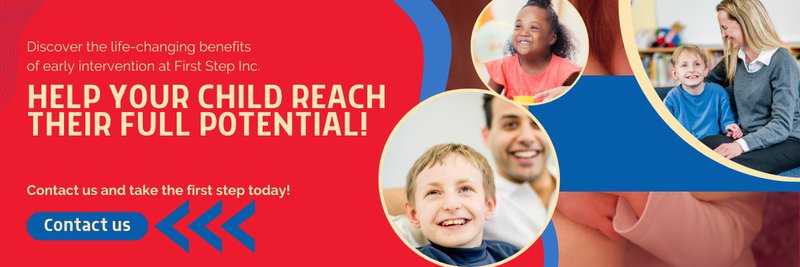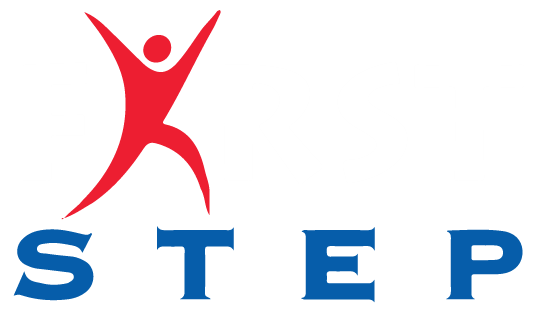Your child or loved one was recently diagnosed with a developmental disability. While you’re still accepting this new reality, it is important to understand, act, and prepare for the next steps, including exploring home and community-based services.
What are the next steps?
As you navigate this pivotal moment in your life, always remember that you are not alone.
The Home and Community-Based Services Waiver Program with First Step, Inc., supports families like yours during these crucial times. Let’s explore this waiver program and see how it helps us tackle upcoming challenges.
What is the Home and Community-Based Services Waiver Program?
The Home and Community-Based Services Waiver Program offers an excellent alternative for individuals who prefer receiving long-term care in their homes or community settings rather than in institutional environments.
Established under Section 1915(c) of the Social Security Act, Home and Community-Based Services Waivers provide states considerable flexibility to tailor services that meet the specific needs of different populations at risk of institutionalization.
These state-operated waivers are formulated with several key objectives. Specifically, they should:
- Be more cost-effective than institutional care.
- Enhance the health and welfare protections for participants.
- Ensure services are delivered according to a personalized, person-centered care plan.
States can modify certain Medicaid requirements under Home and Community-Based Services Waivers. This includes targeting waivers to specific areas or groups, such as the elderly or individuals with specific conditions, like autism or cerebral palsy.
Additionally, these waivers can adjust financial eligibility criteria, making Medicaid more accessible to individuals with limited resources or low income who would not qualify under conventional circumstances.
In Arkansas, two major waiver programs cater specifically to people with developmental disabilities: the Alternative Community Services (ACS) Waiver and the Community and Employment Support (CES) Waiver.
ACS Waiver
The ACS Waiver Program, a joint effort of state and federal agencies, offers community-based support for individuals with developmental disabilities.
The ACS Waiver offers a more independent community living alternative to institutional care. It is designed to support individuals whose developmental disabilities manifest before age 22 in less restrictive and more inclusive settings.
Funded jointly by state and federal sources, the ACS Waiver is a partnership between the Centers for Medicare and Medicaid Services (CMS) and Arkansas’s Division of Medical Services, alongside the Division of Developmental Disabilities Services (DDS). It relaxes specific Medicaid rules, granting individuals and their families greater flexibility in choosing how and where they receive services.
The ACS Waiver is not an entitlement but a voluntary program. It supports a limited number of participants, currently capped at 3,988, as approved by CMS.
Eligibility and Qualifications
Applicants for the ACS Waiver Program in Arkansas must meet the following criteria:
Residency
Applicants can apply from another state, but to receive services, they must be residents of Arkansas.
Financial Criteria
The financial requirements for the ACS Waiver include a monthly income limit of $2,022 (three times the Supplemental Security Income (SSI) federal benefit rate) and an individual resource limit of $2,000.
Diagnostic/Medical Criteria
Applicants must have a severe, chronic developmental disability as defined under Arkansas Statute Ann. 20-48-101 and Act 729 of 1993. This includes intellectual disabilities, cerebral palsy, epilepsy, autism, or other conditions closely related to intellectual disability that result in similar impairments or require similar treatments.
These conditions must have originated before age 22 and be expected to continue indefinitely.
Intermediate Care Facility (ICF) Level of Care
To qualify, a person must be eligible for the level of care usually provided in an ICF. This includes substantial limitations in three or more of the six major life activity areas: self-care, language, learning, mobility, self-direction, and independent living.
Individuals whose primary diagnosis is mental illness, with symptoms resembling those of developmental disabilities, don’t qualify for an ACS Waiver.
Services Covered
The waiver services focus on achieving greater independence through active treatment and progress toward personal goals.
Here is an overview of the key services covered by the ACS Waiver Program:
Supportive Living
Supportive living services assist individuals in their homes and communities. Direct care staff work closely with individuals to achieve goals identified in their person-centered service plan (PCSP). This includes improving self-help, socialization, and adaptive skills.
Residential Habilitation Supports
With this service, individuals can acquire or enhance various skills, enabling them to live more independently. When behavior issues require psychotropic medications, a formal behavior plan ensures well-being and progress.
Companion and Activity Therapies
Companion and activity therapies often use animals to motivate and assist individuals to achieve specific developmental goals. These goals include enhancing language skills, increasing physical mobility, and improving social interactions. Notably, this service excludes costs related to the care of animals used in therapy.
Respite Care
Respite care provides temporary relief to caregivers from their duties, offering short-term care for individuals who cannot care for themselves. This service is vital for supporting the sustainability of care provided by family members and other non-paid caregivers.
Non-Medical Transportation
This service facilitates access to community services, activities, and resources as outlined in the individual’s PCSP. It complements medical transportation services provided under the Medicaid State Plan, offering greater flexibility and access to necessary non-medical community engagements.
Application Process
Eligible individuals or their parents, guardians, or representatives should first contact the DDS to apply for the ACS Waiver.
Adults are directed to DDS’s Quality Assurance, where intake and referral specialists manage the initial stages of the application. DDS Children’s Services facilitates the process for children through a service coordinator.
After the initial referral, a DDS representative contacts the applicant or their representative to discuss the available options between waiver services and Institutional Care Facility (ICF) services. This choice must be formally made using a DDS-approved form.
Once the waiver is selected, the applicant completes an application packet with the assistance of the intake and referral specialist or service coordinator.
After submitting and processing the application, officials place eligible applicants on a waiver request list. Applicants or their guardians can inquire about the status of their application or their position on the waiting list by contacting the DDS Applications Unit directly at 501-683-0571.
CES Waiver
The CES Waiver Program is intended to assist clients with intellectual or developmental disabilities (IDD) engage in all major life activities. This includes support for living independently and finding employment, where clients may work with an employment coach to navigate the challenges of the job market.
Eligibility and Qualifications
The CES Waiver Program in Arkansas is accessible to individuals of all ages with IDD.
Services Covered
Supported employment services provide necessary support for individuals whose disabilities make competitive employment challenging. Specifically, these services are geared towards individuals needing intensive, ongoing support to engage in work settings, promoting employment at or above minimum wage where possible.
Application Process
The first step in the application process is to contact the DDS Intake and Referral by calling 501-683-5687 or submitting an online request for services. The entire application process is very similar to the ACS Waiver Program.
Once placed on the waiting list, note that the waiting period for the services to begin could extend to about 10 years from your listing date.
While on the waiting list, you may need other forms of health care coverage. Applicants are encouraged to explore options, such as traditional Medicaid, ARKids First, or TEFRA through the Access Arkansas website or apply for SSI Medicaid.
How First Step Arkansas Empowers Families on the Home and Community-Based Services Waiver Program
Through the years, First Step Arkansas has empowered families to navigate the Home and Community-Based Services Waiver Program in Arkansas. Dedicated to fostering growth, independence, and community inclusion, we are instrumental in enhancing the quality of life for individuals with developmental delays, disabilities, and special needs.
We’ve always been committed to supporting people with developmental disabilities by focusing on these critical areas:
- Employment: Facilitate access to work opportunities, helping individuals find and retain jobs that provide financial benefits and enhance personal dignity and fulfillment.
- Independent Living: Assists individuals in developing the skills necessary to live independently in their own homes.
- Skill Development: Provide training and support to improve overall quality of life.
We encourage families and individuals to connect with us and share their stories and needs. Whether you are overwhelmed by the Home and Community-Based Services Waiver Program’s complexity or unsure how to proceed, we are just one message away.
These efforts will foster a broader ethos of empowerment, respect, and community collaboration with those we serve.



